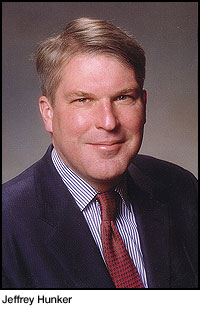|
|
||
|
|
|
Carnegie Mellon Co-Hosts Cybersecurity Brainstorming Series in Nation's Capital Dean Jeffrey Hunker is Series Moderator
The series, scheduled to run through June 2002, began earlier this month with Alan Paller, research director for the System Administration Networking and Security Institute, and Capt. Marcus Sachs of the Department of Defense Joint Task Force Computer Network Operations leading a discussion about emerging threats to cybersecurity.
Heinz School Dean Jeffrey Hunker, formerly the National Security Council Senior Director for Critical Infrastructure in the Clinton Administration, is moderating the series. At the National Security Council, Hunker developed the first-ever national strategy for cybersecurity and protection of critical information systems, the Internet and computer systems.
"The series is designed as a brainstorming session for leading academics, industry and political leaders as the country seeks to better defend itself against the threat of cyberterrorism," said Hunker, who served as in-studio expert for WTAE-TV in its coverage of the Sept. 11 national tragedy. "The series will feature discussion about the responsibility of software developers in network security, risk management and dealing with cyber-attacks."
A recent report by the General Accounting Office (GAO) said that terrorists or hostile foreign states could launch computer-based attacks on critical systems to steal sensitive data and severely damage or disrupt national defense or other critical operations. The GAO report also said that likely targets include the nation's communications system, banks, financial markets, water supplies, transportation and emergency services.
Participants will create several white paper reports from the various sessions for external distribution. They will discuss how such attacks could exploit weaknesses in computer software or the increasingly complex web of wires and routers that supports the Internet.
Speakers at future brainstorming sessions include Pradeep Khosla, the Philip and Marsha Dowd Professor and head of the Electrical and Computer Engineering Department, Richard Pethia, director of the Networked Systems Survivability Program at the Software Engineering Institute, which includes the CERT Coordination Center, and Ashish Arora, associate professor of economics at the Heinz School.
Chriss Swaney
|
|
This Issue's Headlines || Carnegie Mellon News Home || Carnegie Mellon Home |
||
 Carnegie Mellon has joined the Washington D.C.-based AEI-Brookings Joint center on Regulatory Affairs to host an invitation-only brainstorming series for leading policy makers and technologists aimed at shaping the national strategy for cybersecurity.
Carnegie Mellon has joined the Washington D.C.-based AEI-Brookings Joint center on Regulatory Affairs to host an invitation-only brainstorming series for leading policy makers and technologists aimed at shaping the national strategy for cybersecurity.